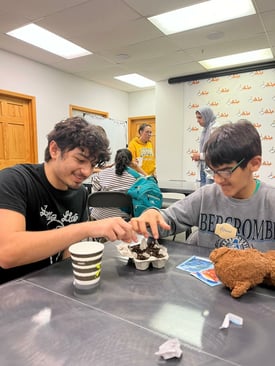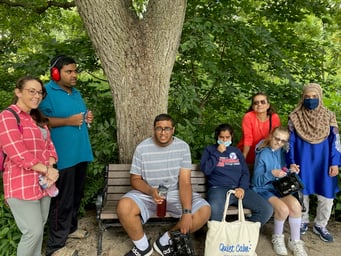Community Spotlight: MUHSEN - Reeve Foundation
 For Muslims with spinal cord injuries or other disabilities that limit mobility, some of the rituals involved in worship can be impossible to perform without accommodations. This fact was not addressed in mosques and Muslim community centers, however, until relatively recently.
For Muslims with spinal cord injuries or other disabilities that limit mobility, some of the rituals involved in worship can be impossible to perform without accommodations. This fact was not addressed in mosques and Muslim community centers, however, until relatively recently.
“There has been a lot of stigma around disability in the Muslim community,” says Hana Khan, Operations Manager for MUHSEN, a program founded in 2014 specifically to address this problem and improve accessibility. (MUHSEN is an acronym for Muslims Understanding and Helping Special Education Needs.)
Khan says one of the reasons disabilities tend to be swept under the rug is that migrant members of the Muslim community often just want to fit in. “They are already from another country and part of a minority religion, and I think also having a family member with a disability makes them feel even more different,” Khan says. As a result, disabled members were finding it hard, if not impossible, to attend religious services and other events.
MUHSEN was founded by Dr. Omar Suleiman, an Islamic scholar and a well-known Imam across the country. The organization has multiple chapters across the United States. Its goal is to provide awareness, accommodations, and acceptance for Muslims of any age with a physical, intellectual, or mental disability.
MUHSEN provides three levels of certification to mosques, or masjids, across the country—silver, gold, and platinum. Each one requires fulfillment of a specific set of criteria. In order for a masjid to be silver qualified, for example, it must have basic wheelchair ramps that provide accessibility to the building and must hold a disability awareness event at the masjid at least twice a year, among other things. To qualify for gold, the masjid must provide everything on the silver checklist, in addition to Braille versions of the Quran, sign language interpreters, and support groups for parents, caregivers, and siblings of those with disabilities. Platinum adds the requirement to have a playground with accessible equipment at Muslim community centers, closed captioning digital display screens, and more.

One of the main challenges facing Muslims who must use a wheelchair or scooter involves a ritual called wudu, in which people wash their feet before attending a prayer service. All mosques have wudu stations in the bathrooms consisting of low stools installed on the floor with a sink below it for washing the feet. To become MUHSEN certified, there must be a wheelchair-accessible wudu station.
Another challenge is full access to the prayer rooms. “If the prayer area is not on the same floor as the entrance and there's no elevator for individuals with physical limitations to access the prayer space, then accommodations must be made within the mosque to become certified,” says Khan.
Furthermore, in the Muslim faith, men and women must pray separately. If installing an elevator is not an option, a single room would have to be divided into two sections, one for each sex.
We’re really thinking way beyond the ADA (Americans with Disabilities Act),” says Khan. “We think about how this person can not only come to this place of worship but perform the prayer rituals which they have the right to perform just like anybody else."
Khan says things have changed dramatically since MUHSEN’s founding in 2014. “It is a world of difference in our community,” she says. “In 2014, disability was a very rare topic of discussion. I mean, we would always know this family's a little different, but no one was really open about it. It was kind of a hushed topic. Now people are so open to talking about special needs. They are starting to get comfortable bringing their families to community events.”
Join Our Movement
What started as an idea has become a national movement. With your support, we can influence policy and inspire lasting change.
Become an Advocate